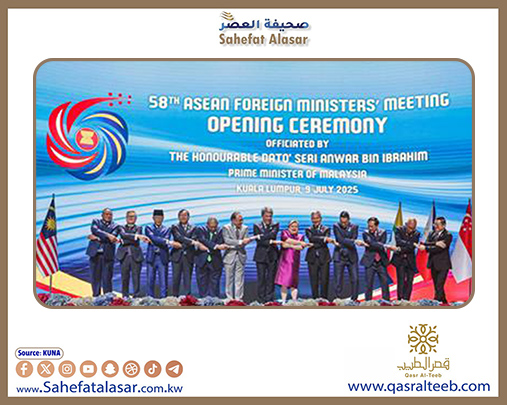


KUALA LUMPUR – The Association of Southeast Asian Nations (ASEAN) warned on Wednesday of the disintegration of the global order amid escalating geopolitical challenges, including the wars in Palestine, Ukraine, and Myanmar, rising tensions in the Middle East, and increasing competition among major powers in the region. The bloc also highlighted the repercussions of global conflicts on markets, supply chains, and food security.
The remarks came during the opening session of the 58th ASEAN Foreign Ministers’ Meeting in Kuala Lumpur, where Malaysian Prime Minister Anwar Ibrahim delivered a comprehensive political address addressing humanitarian, geopolitical, and economic issues. He called for a unified stance against the "moral collapse of the international order."
Ibrahim, who chairs ASEAN this year, stated, “The global order is unraveling—conflict, coercion, and distrust now dominate many international relations, costing millions of lives.” He cited Gaza as the starkest example of this decline, where “we witness the prolonged suffering of an entire people, deprived of dignity and justice for generations.”
He stressed that ASEAN must stand with those defending international rules rather than retreating from them, asserting that “foreign policy realism should not contradict values but align with them. Realism and values are not opposing forces—we need both.”
On the economic front, Ibrahim warned of dangerous shifts in trade and investment patterns, where tariffs, export restrictions, and investment barriers have become tools of geopolitical rivalry. “This is not a passing storm but the new normal of our era,” he said, urging ASEAN to harmonize foreign and economic policies in line with the ASEAN 2045 Vision, which calls for greater synergy across sectors.
He emphasized ASEAN’s strategic autonomy, rejecting division into externally imposed spheres of influence: “ASEAN cannot be represented in its own absence.” The bloc must strengthen intra-regional trade, cross-investments, and integration in digital transformation, climate adaptation, education, and health. “Building a stronger, more interconnected ASEAN economy is a strategic necessity for long-term resilience.”
Malaysia Reaffirms Support for Palestine
Malaysian Foreign Minister Mohamad Hassan reiterated his country’s unwavering commitment to Palestine, noting that the ongoing ministerial meeting includes the 4th East Asia Summit Conference on Palestinian Development, with ASEAN and international dialogue partners—“a testament to ASEAN’s deep solidarity with the Palestinian people.”
Hassan warned that protectionism and geopolitical tensions threaten the global economy, particularly in the Global South: “Distant wars and conflicts disrupt our markets, supply chains, and food security.” He called for enhanced economic integration and diversification to counter these challenges.
Under Malaysia’s 2024 ASEAN chairmanship, guided by inclusivity and sustainability, leaders recently adopted the Kuala Lumpur Declaration on ASEAN 2045: Our Shared Future, aiming to build a resilient, innovative, and people-centered community.
ASEAN Expansion
Founded in 1967, ASEAN comprises ten members: Malaysia, Indonesia, Thailand, the Philippines, Singapore, Brunei, Vietnam, Laos, Myanmar, and Cambodia. It is set to admit Timor-Leste as its 11th member in October.
